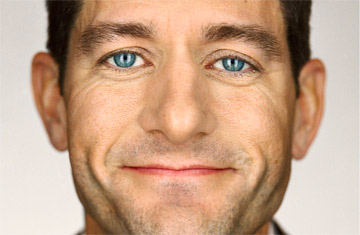
(3 of 4)
For all his love of free-market economics, however, Ryan's critics note that his voting record is more complex. Ryan supported two massive government interventions in the economy, the bank and auto bailouts. Even his Medicare plan doesn't go far enough for some. "He's been very explicit that he wants to save Medicare," notes Edward Hudgins, a senior scholar at the pro--Ayn Rand Atlas Society. "We'd like to see the private sector handle this the way it handles auto insurance."
THE CONGRESSMAN: JACK KEMP
Ryan was just out of college in the early 1990s when he went to work for the man he has called one of his most important mentors, Jack Kemp, at Empower America, a think tank Kemp co-founded after he left Congress. Kemp was perhaps best known at the time as a champion of supply-side economics, which holds that tax cuts will at least partly pay for themselves through faster growth.
Conceived in the mid-1970s when upper-income tax rates were as high as 50%, supply-side theory holds that high taxes smother industry and growth because people don't work as hard to earn more when the government will take a large chunk of their additional income. Crucial to this theory is the idea that tax cuts don't cause big deficits because lower taxes spur growth, expanding the economy and increasing overall tax revenue.
The political appeal is obvious. The problem is that few mainstream economists take pure supply-side theory seriously (though most acknowledge that tax rates can affect growth somewhat). Tax cuts enacted under Ronald Reagan and George W. Bush, after all, were followed by ballooning deficits. For years, fiscal conservatives rejected supply-side theory. George H.W. Bush famously called it "voodoo economics," and GOP budget hawks like former Senators Warren Rudman, Pete Domenici and Alan Simpson generally agreed.
Ryan is among a new generation of Republicans who see it differently. As a young man, Ryan was dazzled by Kemp's vision, says Bruce Bartlett, a former Kemp aide and a recent critic of modern supply-side boosters. "There have always been groupies who hang around the supply-side movement and who kind of worship the ground that Jack Kemp walked on, and Paul was one of them."
Ryan's budgets would cut taxes by $4.3 trillion over the next decade, according to an analysis by the nonpartisan Tax Policy Center, while he has detailed spending cuts of only about half that sum. Ryan says his tax cuts would help make up the difference, juicing the economy and increasing revenue. But his assumptions about growth under his plan are highly optimistic and not widely shared.
